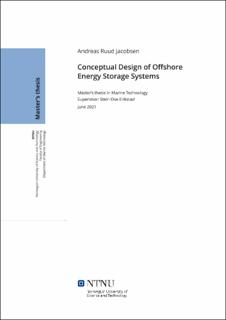| dc.contributor.advisor | Erikstad, Stein Ove | |
| dc.contributor.author | Jacobsen, Andreas Ruud | |
| dc.date.accessioned | 2021-09-24T16:59:15Z | |
| dc.date.available | 2021-09-24T16:59:15Z | |
| dc.date.issued | 2021 | |
| dc.identifier | no.ntnu:inspera:78668897:25573630 | |
| dc.identifier.uri | https://hdl.handle.net/11250/2781531 | |
| dc.description.abstract | Mange fornybare energikilder som vind, sol og bølger er intermitterende energikilder. Dette fører ofte til en ubalanse mellom energibehov og produksjon. Den reduserte kommersielle kapasiteten til intermitterende produksjoner av fornybar energi muliggjør en fremtidig vekst i energilagringsmarkedet. Hovedmålet med denne oppgaven er å skape en produktplattform for konseptuell design av offshore energilagringssystemer og undersøke de positive og negative aspektene ved designmetoden. Oppgaven tar sikte på å etablere plattformenes gjennomførbarhet og undersøke dens evne til å effektivt konfigurere høytytende offshore energilagringssystemer. Oppgaven utfører den nødvendige undersøkelsen for å muliggjøre god beslutningstaking når man tar designtilnærmingen. Hovedproblemet med en modulær designtilnærming for offshore energilagringssystemer er dårlig akkommodering for innovasjon, som kreves for å utforme slike systemer. Den oppnådde produktplattformen løser dette problemet ved å dele designprosessen i to segmenter. Utviklingen av modulene og konfigurasjonen av disse modulene. Plattformen isolerer innovasjonen i utviklingen av modulene, noe som muliggjør fordelene med nedstrømsstrategier for konfigurering av offshore energilagringssystemer. Disse utviklingsmetodene ble hentet fra inspirasjon fra Pahl og Beitz Systematic Approach, Configuration-Based Design og Hazelriggs Decision-Based Design. Produktplattformen anses mulig og gir en rekke fordeler med den konseptuelle utformingen av offshore energilagringssystemer. Det muliggjør sammenligning og evaluering av et stort antall designpunkter, noe som gjør det lettere å identifisere det optimale systemet. Standardiseringen som modularitet gir, vil ifølge teorien være til fordel for løsningens kostnadseffektivitet ved å senke både produksjons- og vedlikeholdskostnadene til systemet. Imidlertid har validering i form av eksperimentell og beregningstesting av plattformers effektivitet ikke blitt utført. | |
| dc.description.abstract | Many renewable energy sources such as wind, solar and wave are intermittent energy sources. This often leads to an imbalance between energy demand and production. The reduced commercial capability of intermittent renewable energy production is enabling growth in the energy storage market. The main goal of this thesis is to create a product platform for the conceptual design of offshore energy storage systems and investigate the positive and negative aspects of the design method. The thesis aims to establish the feasibility of the platform and investigate its capability of efficiently configuring high-performance offshore energy storage systems. The thesis performs the necessary research to enable good decision making when developing the design approach. The main issue of a modular design approach for offshore energy storage systems is the poor accommodation for innovation, which is required to properly design such systems. The product platform obtained solves this issue by dividing the design process into two segments. The development of the modules and the configuration of these modules. The platform isolates the innovation to the development of the modules, enabling the benefits of downstream strategies for the configuration of the offshore energy storage systems. These development methods were derived using inspiration from Pahl and Beitz's Systematic Approach, Configuration-Based Design and Hazelrigg’s Decision-Based Design. The product platform is deemed feasible and provides a number of benefits to the conceptual design of offshore energy storage systems. It enables the comparison and evaluation of a large number of design points, making it easier to identify the optimal system. The standardisation that modularity provides will according to theory benefit the cost-efficiency of the solution by lowering both the production and maintenance cost of the system. However, validation in terms of experimental and computational testing of the platform's efficiency is not performed. | |
| dc.language | eng | |
| dc.publisher | NTNU | |
| dc.title | Conceptual Design of Offshore Energy Storage Systems | |
| dc.type | Master thesis | |
